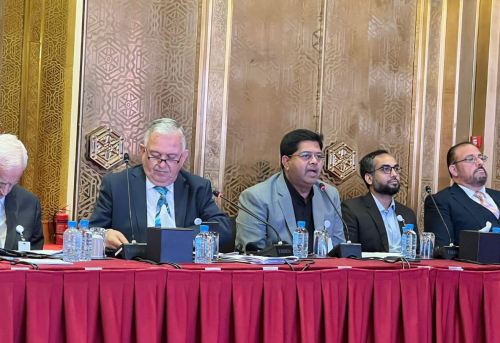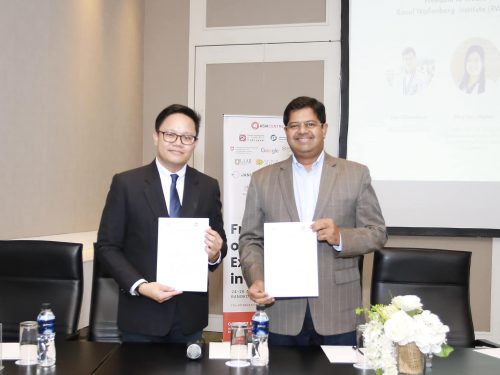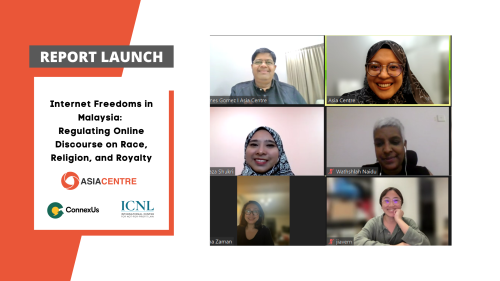Initial findings from “Climate Disinformation in Cambodia: Undermining Indigenous Peoples’ Agency”, the first of seven reports, was discussed on 8 August 2025, with approximately 40 representatives from civil society organisations (CSOs), INGOs and the media sector. The event was held a day before the International Day of the World’s Indigenous Peoples. The discussion underscored the urgency of the findings and the need for a collaborative approach to protecting Indigenous rights ahead of this important day.
Asia Centre, in partnership with the International Media Support (IMS), convened a national meeting where the key finding shows that in Cambodia, climate disinformation hinders Indigenous Peoples (IPs)’ agency to meaningfully take action against climate change and deforestation.

Dr. James Gomez, Regional Director of the Asia Centre, delivered the opening remarks, highlighting the importance of jointly addressing disinformation, particularly climate disinformation from being normalised in Cambodian society. Miss Vanessa Chong, Programme Manager from International Media Support, in her remarks said the media’s role in safeguarding the circulation of accurate information can help mitigate climate disinformation.

Following the opening remarks, the draft report’s key findings were presented by the Asia Centre’s Researcher, Miss Wen-Ling (Amy) Lai for the audience’s feedback and validation.

First, she outlined the background information, centring Indigenous communities and the assessment of climate change and deforestation in Cambodia. She then outlined how the nation’s rapid digital transformation has fuelled the circulation of general disinformation, -which in turn has led to the specific dissemination of climate disinformation.
Second, Miss Lai detailed the four forms of climate disinformation in Cambodia, which include state-aligned one-sided climate discourses, false climate solutions, corporate greenwashing stances and denial of deforestation narratives. Collectively, the climate disinformation reflects broader dynamics in which official messaging obscures the environmental and social consequences of development projects, suppresses critical debate and sidelines Indigenous and local community voices.
Third, she made an assessment of the impacts of climate disinformation on IPs in Cambodia, including exclusion from climate discussions, forced displacements from ancestral lands, intimidation and criminalisation of environmental defenders. Jointly, these impacts deprive Indigenous voices and contribution within meaningful climate dialogue.
Lastly, she presented the report’s key recommendations, which are aimed at a wide range of stakeholders including UN bodies, INGOs, government ministries, CSOs, media, technology companies and Indigenous communities. She particularly stressed the importance of tailoring these recommendations to the specific needs of each IP community.
Following the presentation, the audience provided a range of feedback, centreing around methodology, definition, Indigenous communities’ input and tailoring some of the recommendations.

Following the presentation, a roundtable discussion with six discussants was moderated by IMS’s Mr. Paco Pangalangan. Drawing from the report as well as their own experiences, all discussants engaged with the intersectionality between disinformation, IPs, and the media.
Sao Phal Niseiy, Editor-in-Chief from Cambodianess, emphasised on the importance of empowering media professionals in reporting climate disinformation. He stressed that aside from sharing accurate information to the IPs, we also need to encourage IPs to proactively share Indigenous ecological knowledge to the general public.
Seoung Nimol, Journalist from CamboJA News, saw climate disinformation as a tactic deployed against journalists to deter them from reporting on Indigenous issues. Hence, as journalists, she said it was crucial to ensure accurate information reaches vulnerable communities, including recognising IPs’ role in climate change mitigation efforts and in tackling deforestation.
Yatt Malai, Journalist from Kiri Post, validated the observations made in the report by sharing with the audience her own reporting experience where she witnessed firsthand the attempts to only portray one-sided information. In her visits to the provincial areas, there were often efforts by company owners and local-level authorities who prevented her access to the other side of the story.
Carlos Gallardo, Regional Representative from Cord, recommended the report also consider private sector accountability, the issue of building social cohesion among IPs and community-led environmental initiatives. He said the report has the potential to serve as the starting point for future conversations surrounding climate disinformation.
Kuy Suyheang, Executive Director from Women Peace Makers (WPM), referring to the report’s title, said that climate disinformation not only undermines the agency of IPs from climate mitigation, but also takes away the agency of the Cambodian public to act on this issue.
Vinh Socheata, Media Training Coordinator from Cambodia Center Independent Media (CCIM), said the report reflected the reality of Indigenous communities and their struggles in the face of climate disinformation. She said her organisation has organised training sessions for journalists to strengthen their capacity on climate reporting.
Overall, the draft report was complimented as having captured the key issues, being well structured and bringing into focus the issue of climate disinformation.
Asia Centre’s Dr. Gomez concluded the event by thanking IMS, all panellists and participants for their feedback. He said the feedback was well received and suggestions, where relevant, will be incorporated when finalising the report.



